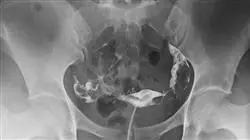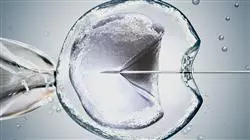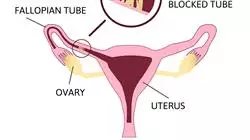University certificate
The world's largest faculty of medicine”
Why study at TECH?
A complete diploma that will allow you to incorporate into your professional practice the latest advances in the diagnosis and approach to your patients with fertility problems, from the specific perspective of fertility preservation"

The assessment of the infertile woman begins by determining her ovarian reserve, mainly through the ultrasound count of antral follicles (AFR) and the determination of anti-mullerian hormone (AMH) in the blood, which has emerged as a fairly specific diagnostic test and has largely replaced the use of other hormonal determinations such as FSH, LH and estradiol, which were traditionally performed in the first phase of the cycle.
For the assessment of tubal patency, although the test considered the gold standard is hysterosalpingography (HSG), a technique performed by instilling a hyperechogenic gel through the cervix has recently been described as an alternative for subsequent assessment of the morphology of the uterine cavity and tubal patency by means of vaginal or abdominal ultrasound, avoiding the contrast and radiation used in the classic HSG.
Within endometrial assessment, apart from the classic assessment of the endometrial pattern and thickness by ultrasound, the most recent studies support the usefulness of endometrial receptivity tests at the time of implantation, microbiota studies or diagnosis of altered endometrial immunological profiles, for which reason the current evidence in this field is presented.
One of the most frustrating situations in the field of reproductive medicine, both for the patient and the clinician, is implantation failure or repeat miscarriage. This module reviews their definitions and describes the possible complementary tests and treatment options that could be performed in these patients, with their greater or lesser scientific evidence.
Although reproductive treatments such as IVF-ICSI facilitate fertilization of the egg by the sperm in situations where the anatomy is distorted, improving gestation rates (for example, in tubal obstructive factors), in some situations these anatomical alterations can negatively influence implantation after embryo transfer. Cases of endometrial polyps and submucosal polyps are evident, but also the existence of hydrosalpinx (whose contents could drain into the uterine cavity exerting an embryotoxic effect) and other anatomical alterations, which are described in the module.
With a methodological design based on proven teaching techniques, this postgraduate diploma course will take you through different teaching approaches to allow you to learn in a dynamic and effective way”
This Postgraduate diploma in Fertility Preservation, Indications and Techniques. Cryobiology offers you the benefits of a scientific, teaching and technological high-level course. These are some of its most notable features:
- Latest technology in online teaching software
- Highly visual teaching system, supported by graphic and schematic contents that are easy to assimilate and understand
- Practical cases presented by practising experts
- State-of-the-art interactive video systems
- Teaching supported by telepractice
- Continuous updating and recycling systems
- Self-regulating learning: full compatibility with other occupations
- Practical exercises for self-evaluation and learning verification
- Support groups and educational synergies: questions to the expert, debate and knowledge forums
- Communication with the teacher and individual reflection work
- Content that is accessible from any fixed or portable device with an Internet connection
- Supplementary documentation databases are permanently available, even after the course
Our innovative telepractice concept will give you the opportunity to learn through an immersive experience, which will provide you with a faster integration and a much more realistic view of the contents: “learning from an expert”
Our teaching staff is composed of medical professionals, practising specialists. In this way, we ensure that we provide you with the training update we are aiming for. A multidisciplinary team of professors with training and experience in different environments, who will develop the theoretical knowledge in an efficient way, but, above all, will bring their practical knowledge derived from their own experience to the course: one of the differential qualities of this Postgraduate Diploma.
The efficiency of the methodological design of this master's degree, enhances the student's understanding of the subject. Developed by a multidisciplinary team of e-learning experts, it integrates the latest advances in educational technology. This way, you will be able to study with a range of comfortable and versatile multimedia tools that, will give you the operability you need in your training.
The design of this program is based on Problem-Based Learning: an approach that conceives learning as a highly practical process. To achieve this remotely, we will use telepractice: with the help of an innovative interactive video system, and learning from an expert, you will be able to acquire the knowledge as if you were actually dealing with the scenario you are learning about. A concept that will allow you to integrate and fix learning in a more realistic and permanent way.
Increase your decision-making confidence by updating your knowledge with this Postraduate Diploma course"

You will be trained by professionals with extensive experience in the sector, who have deposited all their knowledge and experience in the development of this program"
Syllabus
The contents of this Postgraduate diploma have been developed by the different experts of this course, with a clear purpose: to ensure that our students acquire each and every one of the skills required to become true experts in this field. Knowledge that will enable you to respond in an efficient way to each and every one of the needs in this area of medicine.

A comprehensive teaching program, structured in well-developed teaching units, oriented towards learning that is compatible with your personal and professional life"
Module 1. Gamete Interaction Fertilization Embryonic Development
1.1. Interaction of Gametes in the Female Tract
1.2. Acrosomal Reaction and Hyperactivation
1.3. Sperm-oocyte Interaction
1.4. Sperm-oocyte Fusion Oocyte Activation
1.5. Embryonic development
1.6. Main Characteristics in Preimplant Development
1.7. Implantation. Embryo-endometrium Interaction
1.8. Pathology of Fertilization and Embryo Classification.
1.9. Embryo Culture In Vitro Embryo Culture Systems Culture Media, Environmental Conditions and Supplements. One Step and Sequential Cultures Renewal of Culture Media and Needs of the Embryo
1.10. In Vitro Embryonic Development Evaluation: Morphology and Morphokinetics Classical Embryonic Morphology Time-lapse Systems Embryonic Morphokinetics Embryonic Classification
Module 2. Gamete and Embryo Cryopreservation
2.1. Cryobiology Cryobiological Principles and Cryoprotective Agents Cryopreservation Systems Factors Affecting the Freezing Process Additives and Application of Cryobiology
2.2. The Sperm Cell Structure and Functionality Physicochemical Processes that Induce Freezing in the Spermatozoon Factors Determining Sperm Fertilization and Viability after Thawing
2.3. Cryopreservation of Semen Features. Regulations
2.4. The Oocyte Characteristics and Conditioning Factors in Cryopreservation Importance and Method of Selection Ethical and Legal Aspects
2.5. Cryopreservation in Human Embryos Importance and Method of Selection Ethical and Legal Aspects
2.6. Cryopreservation of Ovarian Tissue Laboratory Technique
2.7. Factors Affecting Performance in a Cryopreservation Program
2.8. How to Manage and Organize a Biobank and its Security
Module 3. Fertility Preservation
3.1. Fertility Preservation Cancer Epidemiology Age and Reproduction
3.2. Fertility Preservation for Non-Medical Reasons
3.3. Fertility Preservation for Oncologic Reasons
3.4. Fertility Preservation for Non-Oncologic Medical Reasons
3.5. Oocyte Vitrification Technique and results.
3.6. Ovarian Cortex Cryopreservation
3.7. Cryopreservation of Semen
3.8. In Vitro Maturation of Oocytes
3.9. Other Methods of Fertility Preservation: Conservation Surgery in Gynecologic Cancer Ovarian Transposition
3.10. Treatment with GnRH Analogues Prior to Gonadotoxic Treatments

A unique, key, and decisive training experience to boost your professional development”
Postgraduate Diploma in Fertility Preservation, Indications and Techniques. Cryobiology
TECH Global University presents you with a unique opportunity to become a fertility expert with our Postgraduate Diploma program in Fertility Preservation, Indications and Techniques. Cryobiology. Through our online classes, you will have the opportunity to gain the knowledge and skills necessary to provide solutions for those who wish to plan their reproductive future. Online classes are the most convenient and flexible way to learn. You will be able to access the content of the program from the comfort of your home or any other location you prefer. You no longer have to worry about long commutes in one city from one point to another. With our online classes, you decide when and where to study, allowing you to balance your personal and professional responsibilities. In our Postgraduate Diploma program in Fertility Preservation, Indications and Techniques, you will immerse yourself in a comprehensive curriculum ranging from advanced fertility fundamentals to the latest cryobiology techniques. You will learn about the indications for fertility failure, available treatment options and the most advanced cryopreservation techniques.
Help your patients find the future they want
Our team of expert faculty will guide you through the program, providing you with quality education and personalized support. You will learn from experienced fertility professionals who will share their knowledge and best practices with you. Get ready to excel in the fertility field and make a difference in people's lives. Enroll in our Postgraduate Diploma program in Fertility Preservation, Indications and Techniques at TECH Global University and gain the skills necessary to provide reproductive options for those seeking to plan their future with confidence. Your knowledge can make dreams come true for many people!







